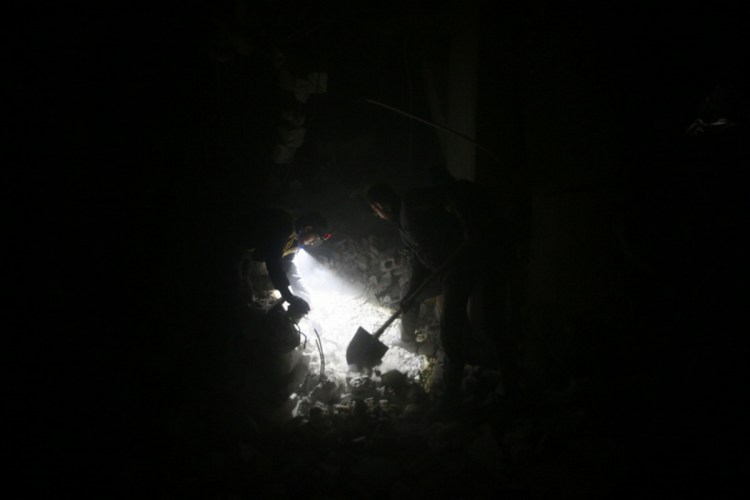WATERVILLE — In one photo, men pull a baby from the rubble left by a Syrian regime airstrike in the city of Douma.
In another, an injured man is pulled from debris at a site struck at least five times by the air force of Syrian President Bashar al-Assad.

Bassam Khabieh
A man holds the body of a dead child killed by nerve gas attacks as others lie wrapped in white tarps.
These are the images of Bassam Khabieh, a Syrian photographer who has been documenting the country’s ongoing civil war since 2011.
Khabieh, who is in Turkey and is trying to get to the United States for a fellowship at Colby College, received his visa last week after delays the college said were related to a travel ban affecting predominantly Muslim countries, including Syria.
“It was a very difficult, long process,” Khabieh said in an interview Wednesday from Istanbul. “Two months ago I applied for a visa and kept getting refused. After that, it was a very long and complicated process to get a waiver to have a visa to enter the United States.”
Khabieh, 31, is the 2018 Oak Institute Fellow at Colby. Since 1988, the fellowship has brought human rights activists from around the world to Colby to teach and find respite in Maine.
Before recently learning that his visa waiver had been granted, Khabieh had plans to teach a seminar course at Colby virtually. On Wednesday, he participated by video in an opening exhibit for his work at the Diamond Building.

A man walks through the damage Feb. 23 after an air raid in the besieged town of Douma, Syria.
“For the last seven years in Syria, I’ve been trying to document the war crimes and human rights violations,” Khabieh said in an interview. “I think the fellowship at Colby will be a different way to try and move a message and make people know how the war was and what’s happening here in Syria.”
Khabieh was a student of information technology when the war broke out in 2011 and he started photographing it with his cellphone.
He said the Syrian government tried to erase all evidence of war crimes in the country, including by limiting the areas that could be accessed by foreign journalists.
“I thought, maybe I will be the one who starts documenting the crimes and human rights violations in my area,” he said.
Today his photos have been published by Reuters, The Atlantic and by organizations such as UNICEF and the World Health Organization. Many of them focus on the effects the war has had on children, and Khabieh is also working on publishing a book, “Witness to War: The Children of Syria,” that tells their stories.
“Children are the most vulnerable victims of the war,” he said. “They don’t know why they are suffering. They know nothing about the war.”

A man hugs a child March 19 during an evacuation in the besieged town of Douma, Syria.
The semester-long fellowship would be the first time Khabieh has traveled to the U.S., though he said through Colby he has developed many friendships in Maine and elsewhere. Last summer, a 2015 Colby graduate, Milton Guillen, shot and directed a film about the photographer in Istanbul.
“I think this will be a great chance for me to communicate in person and to work with (faculty and students) in their research on human rights and how to cover human rights violations with photos, how to deal with war circumstances and how to be a journalist in a war zone,” Khabieh said.
He also said he is hopeful his work can help prosecute the perpetrators of war crimes, including the Syrian government.
“We have a lot of information, a lot of raw data, but we need to work more on this information and try to make a legal document to make evidence and explain how this material is evidence of human rights violations,” Khabieh said. “We have a lot of information. We need analysis.”
Rachel Ohm — 612-2368
Twitter: @rachel_ohm
Send questions/comments to the editors.



